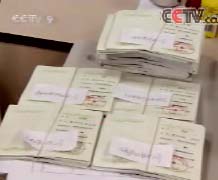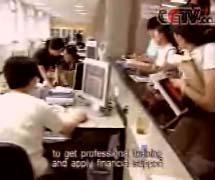 Beijing “Green Card”, this little green book is sought after by millions of people. Having or not having one can make a big difference for a non-Beijing resident who takes Beijing as home. Officially it is called the Beijing Working and Residency Certificate. Unofficially, it’s the Beijing “Green Card”. In 1999, such certificates were first issued to a limited group of people in the high-tech field. In the following year, senior managers who have investment in Beijing were granted certificates. This year, the door is opened even wider. Beijing “Green Card”, this little green book is sought after by millions of people. Having or not having one can make a big difference for a non-Beijing resident who takes Beijing as home. Officially it is called the Beijing Working and Residency Certificate. Unofficially, it’s the Beijing “Green Card”. In 1999, such certificates were first issued to a limited group of people in the high-tech field. In the following year, senior managers who have investment in Beijing were granted certificates. This year, the door is opened even wider.
“The new ‘green card’ policy issued this year differs from the previous ones. It offers treatment for green card holders equal to that given to Beijing natives. It covers eight categories: This includes the right to get professional training and apply financial support for scientific research programs, join the social security system, get a driver’s license, process documents for overseas business trips etc.. I believe it is good news for many talented and skilled workers in Beijing,” said Xin Tieliang, director of Beijing’s Personnel Bureau.
The new policy says that anyone can apply for the “Green Card” if they can meet the following qualifications:
A: two years working experience in Beijing, a bachelors degree or above.
B: an intermediate professional title or above or equivalent qualifications.
C: Distinctive contributions to the capital’s economy and society or skill or talent in a special field and industry most needed in Beijing.
The new policy also provides that those who hold “green cards” over three years are allowed to apply for a permanent residence permit known as the Hukou, a document of a full-fledged Beijing resident. In another word, it means enjoying equal rights and benefits a Beijinger has. This new policy is expected to meet the city’s demand for talents.
“Beijing has over 100 human resource centers. Especially after China’s entry into WTO, many well-known overseas human resource consulting companies establish offices in Beijing. They are very active and are good for attracting skilled workers. As you may have noticed, each year, 80 percent college graduates find jobs through these centers,” said Xin Tieliang, director of Beijing’s Personnel Bureau.
The new policy is certainly good news for the city’s development. But for many of those who work in Beijing without a permanent residence permit, getting the “green card” means solving their status and some very practical problems. Mr. Wang has come to work in Beijing for over 10 years. He spent the whole night browsing the Internet for application information about green card when he first learned the news. He was one of the first to arrive at the gate of the Beijing Personnel Bureau of Haidian District. He had thoughtfully taken with him all the personal documents he could think of.
He hopes to solve the problem that has bothered him and his family for the past 10 years. His six-year old daughter is going to school in July this year. He wishes to get the green card before school begins.
“I will have to pay a fee to the school for financial support when she enrolls. If I have a green card, I will be exempt from paying the fee, a benefit enjoyed by native Beijingers,” said Wang Yong, Green Card applicant.
Sharing the same headache as Mr. Wang is Mr. Shao Hongbo, a manager of a Beijing based company. In spite of his success in business, Shao constantly finds himself in an awkward situation as many outsiders face. Ever since his twin daughter started kindergarten, he began to feel the huge difference between being an outsider and a Beijinger.
“When they first went to kindergarten, we didn’t have very much money. Teachers and children knew they were non-Beijing natives and were prejudiced against them,” said Shao Hongbo, a businessman.
 This summer, his twin daughters have reached the age to start school. Simply because the father is non-native resident, the school asked him to pay 60,000 yuan - an equivalent to 7,500 US dollars for each of his daughters as his financial aid to the school. On top of that, he needs to pay management fee of 2,000 yuan for the twins, which is about 240 USD.
This summer, his twin daughters have reached the age to start school. Simply because the father is non-native resident, the school asked him to pay 60,000 yuan - an equivalent to 7,500 US dollars for each of his daughters as his financial aid to the school. On top of that, he needs to pay management fee of 2,000 yuan for the twins, which is about 240 USD.
Getting children into a school is only one of many problems an outsider has in his non-native city. In the past seven years, Shao and his family have experienced a great deal of unfair treatment. He can not buy an apartment subsidized by local government. In Beijing, buying a commercial house on the open market, he has to pay an extra 1,000 yuan, about 120 USD, a fee required of outsiders. Even when he purchases a house, the property can not be registered under his name. And the same situation applies if he wants to buy a car or a telephone. He has to use a friend’s name. Some of the difficulties Shao says he can manage to overcome but others he can not. He says there were times when he’d take a walk on the street, he was stopped by security police for questioning because he speaks with an accent that suggests he is non-local resident. He isn’t comfortable with that experience.
Getting a local green card has been a dream shared by millions of people like Mr. Shao. Soon after the new policy was published through various media, many people begin logging onto the Internet or simply going to the Beijing Personnel Bureau to request application information.
“My company has about 160 staff. Ninety-five percent of them don’t have permanent Beijing residence. I am very worried that they may leave my company. Many have already left,” said a manager.
The number of non-native Beijing residents exceeds 2.6 million. Beijing’s total population is well over 12 million. Since the city began issuing working and residence certificates, over 10,000 have obtained the certificate. Still a large number of them are looking forward to getting fair and equivalent status with the local residents
Beijing is not the only city in China that has relaxed its working and residence permit policy. China’s economic powerhouse Shanghai and the special economic zone Shenzhen have earlier issued similar policies. But as the nation’s political center, Beijing’s recent move is widely believed to have a more significant impact on the country’s reform of its registered permanent residence system.
During the interview, the twins kept asking their father what the permanent residence certificate is. Their father was at a loss for words. But he said he didn’t want to see the problems that have happened to him and his wife passed on to his children. At least Beijing Municipal government has taken a positive step in the reform of its management of residency regulations. The benefits for Shao’s children will be more direct. As they grow up, they won’t ask their parents where they belong.
The story of Shao’s family may strike a responsive chord in the hearts of many people who share the similar experiences. But city’s new regulation to ease restrictions on residency at least gives hopes to more and more people to find a place in the capital, a place where they want to call home.
|